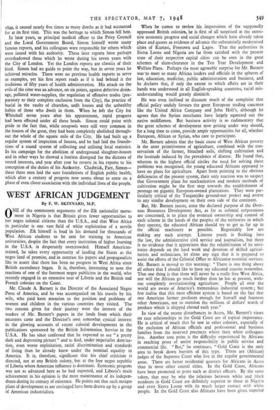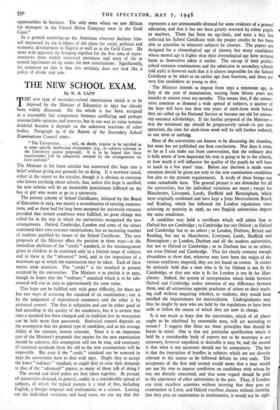WEST AFRICAN JUDGEMENT By F. W. SKINNARD, M.P.
ONE of the commonest arguments of the Zik nationalist move- ment in Nigeria is that Britain gives fewer opportunities to her negro colonial citizens than the U.S.A., and that West Africa in particular is one vast field of white exploitation of a servile population. Zik himself is loud in his demand for thousands of West s African students to be sent for training to American universities, despite the fact that every institution of higher learning in the U.S.A. is desperately overcrowded. Himself American- trained, he takes every opportunity of lauding the States as the negro land of promise, and in contrast his papers and propagandists like to assert that there has been no progress in West Africa since British ascendancy began. It is, therefore, interesting to note the reactions of one of the foremost negro publicists in the world, who recently engaged in an extensive tour of Liberia and the British and French colonies on the Coast.
Mr. Claude A. Barnett is the Director of the Associated Negro Press of America, and he was accompanied on his travels by his wife, who paid keen attention to the position and problems of women and children in the various countries they visited. The two reasons given for their journey were the interest of the readers of Mr. Barnett's papers in the lands from which their ancestors came and the Director's own somewhat cynical interest in the glowing accounts of recent colonial developments in the publications sponsored by the British Information Service in the U.S.A. He has since confessed that he expected to see " a pretty dark and depressing picture " and to find, under imperialist domina- tion, even worse exploitation, racial discrimination and standards of living than he already knew under the nominal equality in America. It is, therefore, significant that his chief criticism is direcied, not at any British colony, but at the free negro republic of Liberia where American influence is dominant. Economic progress was not as advanced here as he had expected, and Liberia's main achievement in his opinion is the mere maintenance of its indepen- dence during its century of existence. He points out that such meagre plans of development as are envisaged have been drawn up by a group of American industrialists.
When he comes to review his impressions of the supposedly oppressed British colonies, he is first of all surprised at the exten- sive economic progress and social changes which have already taken place and quotes as evidence of advance the substantially modernised cities of Kumasi, Freetown and Lagos. That the authorities in Sierra Leone and Nigeria are far from satisfied with the present state of their respective capital cities can be seen in the great schemes of slum-clearance in the Ten Year Development and Welfare Plans. Perhaps the most agreeable surprise for Mr. Barnett was-to meet so many African leaders and officials in the spheres of law, education, medicine, public administration and business, and he declares that, if only the extent to which affairs are in their hands was understood in all English-speaking countries, racial mis- understanding would greatly diminish.
He was even inclined to discount much of the complaint that official policy unduly favours the great European trading concerns like the United Africa Company and John Holt's, although he agrees that the Syrian merchants have largely squeezed out the native middlemen. But business activity is so rudimentary that the great schemes of development now getting under way should, for a long time to come, provide ample opportunities for all, whether European, African or Syrian, who care to participate.
Mr. Barnett admits that the basic cause of West African poverty is the utter primitiveness of agriculture, combined with the con- servatism of the farmer, bleached soils, shifting cultivation and the lassitude induced by the prevalence of disease. He found that, whereas in the highest official circles the need for solving these problems was recognised, the young educated Africans appeared to have no plans for agriculture. Apart from pointing to the obvious deficiencies of the present system, their only reaction was to suspect that Government plans for mechanisation and modern methods of cultivation might be the first step towards the establishment of peonage on gigantic European-owned plantations. They were par- ticularly critical of the Tanganyika ground-nut project and averse to any similar development on their own side of the continent.
But, Mr. Barnett insists, since the declared purpose of the Over- seas Resources Development Act, as far as colonial corporations are concerned, is to place the eventual ownership and control of each scheme in the hands of the peoples of the territories in which they operate, the educated African should try to get as far up in the official machinery as possible. Regrettably few are making any such attempt. Literate youth is flocking into the law, the administrative civil service and journalism, but there is no evidence that it appreciates that the rehabilitation of its terri- tories depends on the hard work and devotion of skilled agricul- turists and technicians, let alone any sign that it is prepared to assist the efforts of the Colonial Office to Africanise essential services. Mr. Barnett is moved to this warning : " There is one thing above all others that I should like to have my educated cousins remember. That one thing is that there will never be a really free West Africa, nor will the African go much farther than he has at present, with- out completely revolutionising agriculture. People all over the world are aware of America's tremendous industrial system ; but few realise that this most efficient system is based on the fact that one American farmer produces enough for himself and fourteen other Americans, not to mention the millions of dollars' worth of produce which is shipped abroad each year."
In view of the recent disturbances in Accra, Mr. Barnett's views on race relationships in the Gold Coast are of topical importance. He is critical of much that he saw in other colonies, especially of the exclusion of African officials and professional and business families from the reserved precincts where their white colleagues live. Another sore point is the difficulty experienced by Africans in reaching posts of senior responsibility in public service and commercial life. " But," he continues, " Gold Coast is the only area to break down barriers of this type. There are (African) judges of the Supreme Court who live in the regular governmental areas. There are better residential quarters for Africans in Accra than in most other coastal cities. In the Gold Coast, Africans have been promoted to posts such as district officers. By the same token, that may be why the relations between white and black residents in Gold Coast are definitely superior to those in Nigeria and even Sierra Leone with its much larger contact with white people. In the Gold Coast also Africans have been given superior
opportunities in business. The only areas where we saw African top managers in the United Africa Company were in the Gold Coast."
In a general summing-up the American observer declares him- self impressed by the boldness of the plans for social, political and economic development in Nigeria as well as in the Gold Coast. He notes with approval the bringing together for the first time of repre- sentatives from widely separated provinces and ways of life in central legislatures set up under the new constitutions. Significantly, his comment on this is that this certainly does not look like a policy of divide and rule.



































 Previous page
Previous page